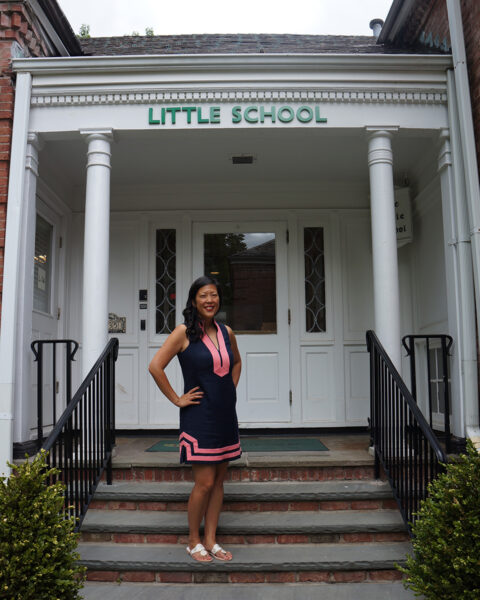Patty Kim joins our Little School community
Originally published in the Summer 2022 edition of “Apple Tree Magazine”
Our new Head of Little School, Patty Kim, joined The Elisabeth Morrow School community on July 1.
Kim comes to us from The Green Vale School in Old Brookville, N.Y., where she was the lower school DEI curriculum coordinator and a first-grade teacher. Over the past two decades, she has taught students in Kindergarten through third grade, and she has planned and implemented curricula in the areas of literacy, mathematics, social studies, DEI, and social-emotional learning, as well as workshops in the areas of media and STEAM.
Since joining our community this summer, Kim has been hard at work planning a rich and inclusive year for Little School students.
What led you to a career in education?
My parents made education a priority for me from a very young age. They immigrated from South Korea in the ’70s, and I was made aware very early on that our family was here so that I could get a great education. I was always in school. When my regular school day was done, I went to after-school enrichment programs each day. Many weeknights found me at music school, then on Saturdays, I went to Korean school, and my summers were spent at summer school. I had the opportunity to know and admire so many teachers in my life. I know the impact that a great education can have on a child and to get to have a part in designing that education for children is a dream come true.
Tell us a little about yourself.
When I was a young student, EMS would have been the school of my dreams. I loved learning, and I still do. When I was 9, and it was time to pick an instrument at my public school in Queens, I chose the flute because my cousin had one that she could hand down to me. From then on, making music became one of the greatest joys of my life. The experience of being part of an ensemble — working together, listening, quieting down so others can be heard, sharing in the joy after a piece well-played — it’s a musical form of the 4 C’s. Music education profoundly impacted my life. My husband and I met in our high school band, and music is a value we passed down to our two sons. Evan is almost 13 and plays the guitar, cello, and piano. Colin is 10, and he loves playing the clarinet. In addition to music, I have always loved the visual arts. In the tumult of the past two years, I found a lot of solace in drawing and painting. Watercolor pencils are my current favorite medium.
What attracted you to our school?
The teachers! Our beautiful classroom spaces, innovative programs, and exemplary music program are only effective in the capable hands of excellent teachers. Their commitment to EMS, our students, and each other is rare. I am so fortunate to get to support them in their fine work.
Why are the elementary school years so crucial in a child’s education?
The elementary years are when children learn so much of what they need to know in life — how to read, write, add, subtract, etc. But perhaps even more importantly, children learn how to learn in elementary school. They learn to ask questions, research, synthesize their learning, and share it with others. They learn that mistakes are a valuable part of the learning process, and their classrooms are a safe space to make mistakes, so their successes are celebrated as a class. They learn to set goals and persist in achieving them. They learn to work as a team. After powerful learning has happened, they reflect on their efforts. These are all practices that they will rely on for the rest of their lives.
Project-based learning has moved to the forefront of our pedagogy. How does this teaching method create advantages for the students at our school?
Project-based learning is student-centered. Little School students explore their interests and curiosities. It takes a lot of skill to teach in this method, and we are fortunate to have a passionate group of teachers in Little School who model what it means to be lifelong learners. Through project-based learning, our students learn how to be inquisitive and then use the skills and resources we give them to answer their questions. Once they can identify, investigate, and solve problems, they can go out into the world and be changemakers!
Why is social and emotional learning vital to our mission, and how will it continue to evolve within the Little School curriculum?
The 4 C’s provide a powerful framework for social-emotional learning in Little School. Courtesy, cooperation, consideration, and compassion shine through in so much of what we do, from a courteous greeting at carline to cooperative project-based learning. As a parent, the 4 C’s reflect the kind of people I would want my children to be. In Little School, social-emotional learning is taught with intention. Our teachers’ use of Responsive Classroom is an excellent example of this.
I also believe that social-emotional learning is intrinsic to the work of diversity, equity, inclusion, and belonging, which has been a passion of mine for a long time. When children have a sense of safety and belonging and feel like they are an essential and respected part of our community, it changes their brains, so they are more primed to learn. Recent research on this topic — neuroplasticity — affirms the work already happening in Little School classrooms.
How do Little School experiences prepare lower school students to lead?
Our Little School teachers are leaders and role models, so our students have that behavior modeled for them daily. They also give the children opportunities to be leaders, from project presentations to group work in the classroom to sharing during Morning Meeting.
How will your experience as a diversity, equity, inclusion, and belonging (DEIB) practitioner influence your work in Little School?
As I walk through the halls at EMS, I see the beautiful diversity of our community. Part of my job as a division director is to continue the work of making Little School a place where anyone can feel welcome. Our diversity is a strength to be celebrated in our increasingly interconnected and interdependent world. One of my favorite poems is “& SO” by National Youth Poet Laureate Amanda Gorman. Here is an excerpt:
Since the world is round
There is no way to walk away
From each other, for even then
We are coming back together.
Even in the moments when we walk away, we are always coming back together at EMS. DEIB work isn’t easy — it is about listening to and honoring each other’s stories. Our stories are who we are, so they’re deeply personal. When we share them, we make ourselves vulnerable to each other. Little School is perfect for learning the art of listening because first through fourth graders love nothing more than a good story!
What will a lower school education at EMS look like in the coming years?
When you asked me earlier what drew me to EMS, many possible answers came to mind. Yet another reason is that EMS is cutting edge; we use the latest research-based instruction. It is so exciting to be a part of that! I can’t say what innovations the years ahead will bring, but I know that best practices will guide us. While the topics we teach and how we teach them may evolve, the 4 C’s provide guideposts that make everything we do uniquely EMS.
There's No Better Time to Support Your Child's Education
Every time you donate to one of Elisabeth Morrow's dedicated funds, you help enrich the daily experiences of our community on campus. STEAM spaces are improved, library catalogs are expanded, scholarships are funded, and teachers are hired. Every day, you can see the impact your generous donations have on campus.


